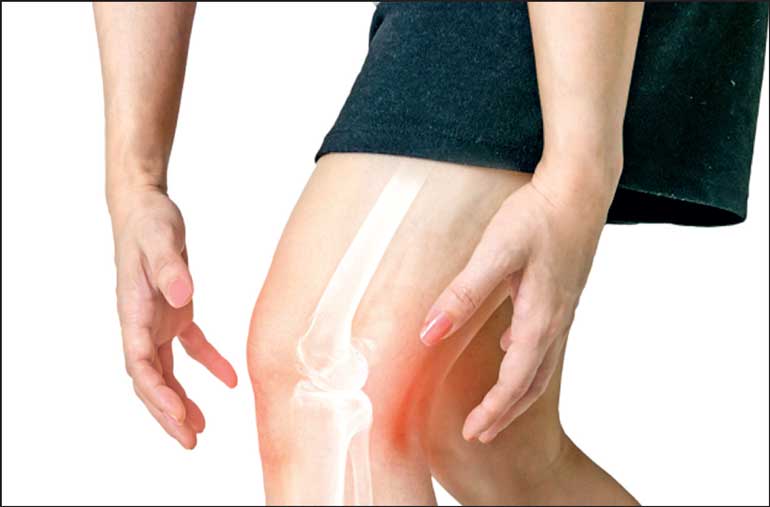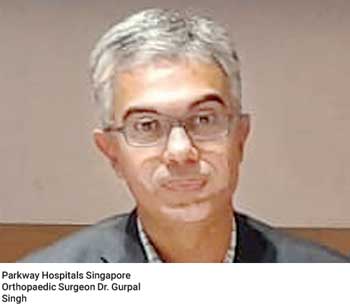Wednesday Feb 18, 2026
Wednesday Feb 18, 2026
Tuesday, 6 June 2023 00:00 - - {{hitsCtrl.values.hits}}

Bone cancer pain is typically deep-seated and localised
In most cases, bone cancer is not hereditary and occurs without any genetic cause. In some cases, bone cancer can be hereditary and there are certain genetic mutations or genetic syndromes known to increase the risk of developing bone cancer such as ‘hereditary retinoblastoma’, ‘Li-Fraumeni syndrome’ and ‘hereditary multiple exostoses’. It is advisable to discuss your situation with your trusted healthcare provider should you have a family history of bone cancer or other cancer
 A lesser known cancer, bone cancer, though rare, can be aggressive and deadly. If diagnosed late, it can be difficult to treat and therefore awareness of symptoms, and early detection is vital. “The exact cause of most bone cancers remains unknown, so their prevention is difficult. Maintaining a healthy lifestyle, monitoring yourself for any changes and getting regular check-up with your trusted doctor can help to reduce your overall risk of cancer, promote overall health and wellness, and can help to identify potential health concerns in their early stage,” says Parkway Hospitals Singapore Orthopaedic Surgeon Dr. Gurpal Singh.
A lesser known cancer, bone cancer, though rare, can be aggressive and deadly. If diagnosed late, it can be difficult to treat and therefore awareness of symptoms, and early detection is vital. “The exact cause of most bone cancers remains unknown, so their prevention is difficult. Maintaining a healthy lifestyle, monitoring yourself for any changes and getting regular check-up with your trusted doctor can help to reduce your overall risk of cancer, promote overall health and wellness, and can help to identify potential health concerns in their early stage,” says Parkway Hospitals Singapore Orthopaedic Surgeon Dr. Gurpal Singh.
In the past, patients in the advanced stage of bone cancer were faced with amputation as the only treatment solution. However, with the advent of state-of-the art technology along with the expertise of orthopaedic oncologists, it is no longer the only option. Specialised orthopaedic oncology teams now offer limb-salvage surgery, in which the cancerous bone is removed while preserving the limb. The removed bone and soft tissue parts are then reconstructed using various techniques. Dr. Singh explains further, in this interview with Daily FT. Following are excerpts:
By Fathima Riznaz Hafi
Q: How common is bone cancer, how serious is it, and is it easily treatable?
A: Bone cancer is considered as one of the rarer forms of cancer, accounting for less than 1% of all cancers. However, bone cancer can be a very aggressive and potentially life-threatening condition. The prognosis depends on the type and stage of the cancer as well as the response to treatment and overall health of the patient.
Bone cancer that is diagnosed at an advanced stage is often more difficult to treat. That’s why it is important to be aware of possible symptoms of bone cancer such as persistent pain, or a tissue growth, and to seek medical attention from a trained orthopaedic oncology surgeon if you experience any of these symptoms.
Q: Can it be prevented?
A: The exact cause of most bone cancers remains unknown, so their prevention is difficult. Maintaining a healthy lifestyle, monitoring yourself for any changes and getting regular check-up with your trusted doctor can help to reduce your overall risk of cancer, promote overall health and wellness, and can help to identify potential health concerns in their early stage.
Q: Is it hereditary?
A: In most cases, bone cancer is not hereditary and occurs without any genetic cause. In some cases, bone cancer can be hereditary and there are certain genetic mutations or genetic syndromes known to increase the risk of developing bone cancer such as ‘hereditary retinoblastoma’, ‘Li-Fraumeni syndrome’ and ‘hereditary multiple exostoses’. It is advisable to discuss your situation with your trusted healthcare provider should you have a family history of bone cancer or other cancer.
The goal of limb salvage surgery is to preserve as much of the normal limb function and appearance as possible without compromising oncological principles. As limb salvage surgery is a highly complex surgical procedure requiring advanced technology and experienced teams, patients undergoing limb salvage surgery should be referred to specialist centres for further management
Q: What are the signs that we need to look out for?
A: Signs and symptoms of bone cancer can be non-specific and can vary depending on the location and stage of the cancer. Some of the signs and symptoms of bone cancer include:
It is important to seek medical attention by a qualified specialist (orthopaedic surgeon trained in musculoskeletal oncology/orthopaedic oncology) if you are experiencing any of these symptoms. As the above signs and symptoms might also be caused by a non-sinister condition, a thorough medical evaluation is required to establish the underlying diagnosis.
Q: With symptoms being similar, how do we differentiate bone cancer from arthritis and other joint diseases?
A: Signs and symptoms can indeed be similar (and non-specific), making it sometimes difficult to differentiate between sinister and non-sinister causes of bone and joint pain. Having said that, there some differences that can help differentiate between bone cancer and arthritis or other joint diseases:
nAge: Bone cancer tends to affect teenagers and young adults, whereas arthritis and other joint diseases are more likely to occur in the elderly.
nPain: Bone cancer pain is typically deep-seated and localised whereas arthritis and other joint disease can present more diffusely and may even involve multiple joints.
nAssociated symptoms: Bone cancer may present with additional symptoms such as unexplained weight loss, tissue growth and fatigue, which are not common in most other joint diseases.
Q: For patients in the advanced stage of bone cancer, the standard procedure has been amputation. Is that still the only available option?
A: While amputation may be one treatment option for advanced bone cancers, it is no longer the only option available. Specialised orthopaedic oncology teams nowadays offer limb-salvage surgery, a complex surgical procedure in which the cancerous bone is removed while preserving the limb (no amputation). The removed bone and soft tissue parts are then reconstructed using various techniques including metal implants, bone grafts, muscle flaps and skin grafting. The goal of limb salvage surgery is to preserve as much of the normal limb function and appearance as possible without compromising oncological principles. As limb salvage surgery is a highly complex surgical procedure requiring advanced technology and experienced teams, patients undergoing limb salvage surgery should be referred to specialist centres for further management.
Q: As an orthopaedic surgeon, what is your advice on how a person could maintain knee bone health?
A: These are some tips for preventing injuries and maintaining mobility:
Dr. Singh can be reached through Parkway Patient Assistance Centre Sri Lanka which facilitates one-to-one sessions with Parkway Hospitals Singapore’s doctors and assists with all the necessary arrangements to seek treatment there.